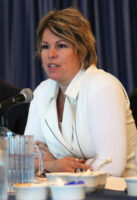POCATELLO — The State Board of Education’s last stop in East Idaho was met with few attendees but a lot of suggestions for ways to implement a statewide school accountability model.
“This is our fifth stop in areas across the state,” said State Board spokesman Blake Youde. “It’s getting harder to hear new ideas, but we are pleased that people keep bringing them.”
A group of 16 educators and parents attended the fifth leg of the State Board of Education’s statewide tour to provide feedback on ways to implement a new system of school accountability, which is already under development.
Idaho has been without an accountability model since repealing the five-star rating system in 2014.
As a requirement of the federal Every Student Succeeds Act (ESSA), states need to have accountability system in place for the 2017-18 school year that meets federal reporting requirements, including student proficiency results on standardized tests.
Education officials in Idaho want to go a step further and create a website called a “data dashboard” that includes multiple measures of quality and achievement.
State Board member Debbie Critchfield and former state superintendent candidate Randy Jensen attended Thursday’s meeting in Pocatello.
Critchfield helped develop the State Board’s proposed accountability model. Despite showing up to catch some first-hand feedback from patrons, she ended up taking part in the meeting and clarifying parts of the State Board’s proposed framework. She called 2017-18 a “trial year” for establishing an accountability model.

“I was a big proponent of getting feedback and a model in place quickly this year because it will essentially be a freebee year,” she said.
The federal government has promised no punitive measures during states’ first year of operation under ESSA.
Critchfield also said the State Board is eager to hear the feedback gathered once the tour is over.
“We intentionally left things broad in order to get people to provide more specific feedback,” she said.
Jensen took his familiar stance that testing data is not a proper indicator of school or teacher success. He cautioned Youde not to let testing stand as the primary indicator of success in Idaho schools.
“The big test is what are kids doing four or five years after graduating,” he said, “and the community in which they live is the best one to determine that.”
Jensen is a 27-year middle school principal in American Falls, which is 25 miles west of Pocatello.

Like in past meetings, much of the discussion revolved around gaining understanding of proposed accountability measures, including chronic student absenteeism and teacher quality and engagement. Those attracted a lot of attention early on.
Several of those in attendance argued that absences are a poor indicator of school quality because they are out of educators’ control.
Currently proposed measurements of teachers quality and engagement include advanced degrees, national board certification and teacher attendance. Some argued that other factors should be considered, including teacher-student ratios and multiple endorsements or college degrees.
State Board officials Tracie Bent and Youde informed attendees that concerns over absenteeism and teacher quality and engagement had surfaced in past meetings and were now on a list to be reviewed by the State Board.
Other suggestions for accountability included:
- Master teacher status.
- Opportunities for improvement versus punitive measures.
- Gauging success on how well students perform the following year in school.
- The number of federal student financial aid forms submitted.
- Diversification of programs offered to students.
Youde and Bent said the small turnouts at meetings thus far haven’t kept them from collecting a lot of feedback.
“We can take those suggestions to other meetings and take them right back to the Board when all of this is done,” said Youde.
Youde and Bent will host two more public meetings in North Idaho next month. They will then report back to State Board of Education members to review before the board is scheduled to vote on approving the accountability system in November.
Anyone wishing to submit written testimony may send an email to the State Board of Education with “accountability framework” written in the subject heading.
Here’s a list of the remaining two meetings, which all run from 6 p.m. to 8 p.m. local time:
- Oct. 18, Coeur d’Alene School District, Midtown Meeting Room, 1505 N. Fifth St., Coeur d’Alene.
- Oct. 20, Lewis-Clark State College, Sacajawea Hall, Room 115, 500 Eighth Ave., Lewiston.
Click here for the State Board of Education’s summary presentation on the new accountability model.
